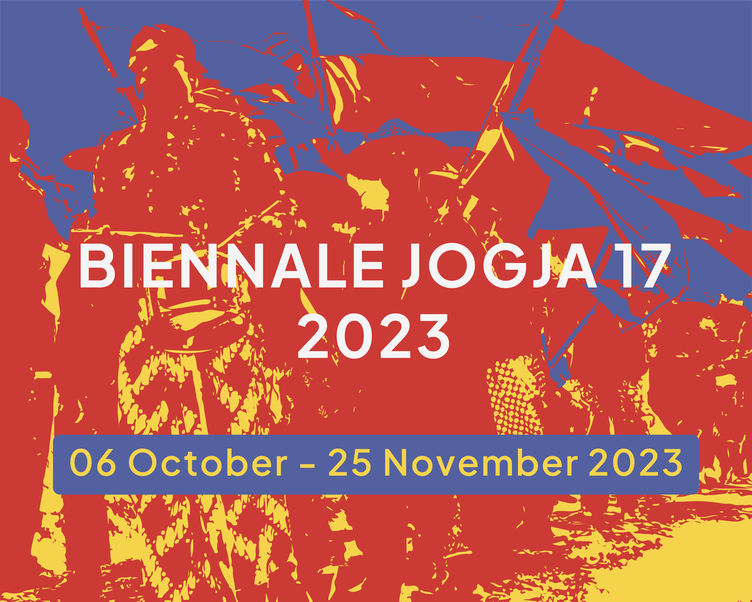Ali Akay, Curator of the 6th Mardin Biennial
28 July 2023The Kaunas Biennial and Survival Kit Announce Artists and Venues for Joint Exhibition Long-distance Friendships
7 August 2023
Image courtesy of Biennale Jogja Foundation.
Biennale Jogja 17
Titen: Embodied Knowledge, Shifting Grounds
October 6, 2023 – November 25, 2023
http://biennalejogja.org
For the next iteration, Biennale Jogja Foundation introduces Translocality and Transhistoricity as the working framework to develop various experiments in curatorial visions and practices. Employing these keywords, the Second Round of Biennale Jogja Equator attempts to continue pursuing the common goal of taking part in the rewriting of world art history and contributing to the projects that strive towards decolonisation within the contemporary, particularly those focusing on re-questioning the definition and framework of geopolitics. The First Round of Biennale Jogja Equator formulated the idea of new geopolitics and internationalism by clearly referring to a physical region on the map (23° N to 23° S). The idea offers a criticism and a new interpretation of the art world map, successfully gaining attention of various parties. By collaborating with India, the Arab Region, Nigeria, Brazil, Southeast Asia, and the Pacific, Biennale Jogja successfully gathered hidden historiographies and re-examined the network of Global South internationalism which was shaped by numerous similarities of landscape, climate, culture, spirituality, and the aftermath of colonialism.
Continuing the experience of investigating localities and embracing the discourse of decolonization that were strongly raised during the first round of equator projects, for this iteration Biennale Jogja will be more located in the village area in Yogyakarta, to create an encounter of contemporary art practices with local urban and rural communities, narrating the politic of locations from periphery. There is a rise of recontextualization of “village” as political identity and location that mainly follows the consequences of post-pandemic life, that includes a discourse of human resilience and new paradigm of ecological knowledge. Curators for this Seventeenth Edition of Biennale Jogja are Eka Putra Nggalu (Maumere/Indonesia), Adelina Luft (Romania) and Sheelasha Rajbhandhari and Hit Man Gurung (Nepal), with Nataša Petrešin-Bachelez as curatorial consultant.
“Titen: Embodied Knowledge, Shifting Grounds” is the title chosen to reflect diverse but shared movements around the Global South practices and the historical connection to South-to-South trajectories. Borrowed from Javanese language, where the villages reside, and to bring this event closer to the local community, Titen or Niteni in Javanese interpret as an ability or sensitivity to read signs from nature. Titen science is usually used to read natural phenomena before a disaster occurs, or to decide an action needed to respond the nature. Titen science is based on a pattern of repeated observations of nature, so that this pattern will later become a reference for interpreting natural phenomena and to establish a particular scientific narrative from the local belief. Choosing this word has been underlining the curatorial framework on decolonizing knowledge production that operates as a resistance to dominant western methodologies.
Further on curatorial frameworks, each of curators share their thoughts:
“The recent multi-disciplinary efforts developing simultaneously in the Global South and Eastern Europe emphasize the need and urgency to reassess the political (and cultural) dynamics and intersections between the (post)socialist and postcolonial worlds by displacing the binary axes of analysis inherited from the Cold War. In this way we can reveal alternative routes and locations where decolonial politics emerge(d) and strive(d). Acting as a binder between these specific localities, the curatorial framework builds from our inter-related positions as embodied peripheral selves. It departs from existing archives and histories, not to reveal de facto what has been materially erased or hidden historically, but to weave new narratives from a present and critical lens through interdisciplinary and collaborative propositions: reinscribing the collective female voice from the history of the Non-Aligned Movement; carrying on the values of the Yugoslav self-organized and self-sustained principles and forms of organization in the act of revitalising heritage architecture; making and performing collectivities and communalities”. (Adelina Luft)
“These things include the efforts to read women’s movements, queer movements, artists, activists and other social actors as well as awareness to discuss the village as a specific unit in which active citizen participation is intertwined as part of a cultural and bureaucratic community. With our experiments at the Biennale Jogja 17, even in places called ‘villages’ we wish to create a ‘pause’ that brings together all the screws from the field of contemporary art and cultural production. Projects stretch a spectrum of trans-locality with its various contexts, with the aim to to learn from each other, connect, share, build cross-border solidarity which may evolve into a social movement that supports each other and reinforces these screws in the cultural arts field that imagines collectively”. (Eka Putra Nggalu)
“The future of knowledge should be referred to the indigenous life, that spans from origin stories of care, kinship, spirits, resource sharings, shamanistic and nature based practice, and so on. Our curatorial practices in this Biennale Jogja 17 will acknowledge the local images and object making practices as a decolonial praxis that weaves the new realities constructed from migration, mobility, resistance, urbanisation and displacement. Working with artists and local communities from various backgrounds have led us to collaboratively imagine the non-fundamentalists, non-monolithic, plural approaches in our cultural activism to reclaim memory and identity.” (Hitman Gurung and Sheelasha Rajbhandhari)
The Biennale will bring around 70 artists with various approaches and cultural backgrounds, with the emphasis on connection to local context and collaboration with communities. The artists, architects, researchers and cultural producers invited in this edition live and work across multiple places, from Romania to Turkey, Serbia, Slovenia, Bosnia and Herzegovina, Moldova, Slovakia, to Hungary and Ukraine, and Nepal, Pakistan, India, Sri Lanka. Some of them will undergo residencies, others will represent important contributions in opening up a trans-local and trans-historical dialogue.
Timeline for Opening Week
Wednesday, Oct 4th, 2023 : Media and VVIPs Preview at Taman Budaya Yogyakarta
Thursday, Oct 5th, 2023 : Gala Dinner for Media, VVIPs, and VIPs at The Ratan
Friday, Oct 6th, 2023 : Grand Opening at Kampung Mataraman
Saturday, Oct 7th, 2023 : Opening at Desa Bangunjiwo and Curatorial Talks
Sunday, Oct 8th, 2023 : Biennale Forum Day 1 (tbd)
Monday, Oct 9th, 2023 : Biennale Forum Day 2 (tbd)
If you plan to come during the biennale and need a guidance for staying and going around please do not feel hesitate to contact us at hospitality.biennalejogja@gmai
See you in October!



